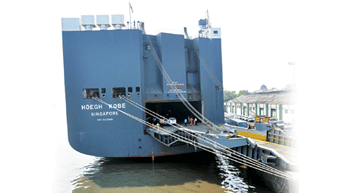The Indian port sector has gathered pace with the government´s focus on revival of the manufacturing sector through the ´Make in India´ campaign. The manufacturing sector is likely to drive the growth of the port sector as the carrier of cargo - ports
FlashNews:
Air India, Lufthansa Group Ink Landmark MoU to Boost India‑Europe Connectivity
GMRIT Achieves Deemed University Status, Strengthens Academic Expansion
India Adds Record 52.5 GW Power Capacity in FY2025‑26, Driven by Renewables
REC to Drive AI‑Powered Energy Innovation at India AI Impact Summit 2026
Inox Clean Energy, RJ Corp Enter Africa’s IPP Market, Target 2.5 GW by FY2029
Best Pills for Erection: Myths, Facts, and Smart Choices
Best Pills for Erection: Audience‑Specific Guidance with Safety Disclaimers
DIAL Launches Family@DEL: First Family‑Centric Travel Initiative at an Indian Airport
India’s SDHI Lands Landmark Oman Defence Ship Deal
Air India Unveils First Line‑Fit Boeing 787‑9, Signals Bold Global Transformation in 2026
Vizhinjam Expansion Strengthens India’s Maritime Competitiveness: Sonowal
Tata Power Odisha Discoms Secure Top National Rankings for Third Consecutive Year
SDHI Secures $227 Million Chemical Tanker Deal, Revives India’s Commercial Shipbuilding
India’s Energy Transition Sets Global Pace: Pralhad Joshi at Davos
IWDC Clears ₹15 Billion Projects to Boost Green Mobility, Cargo and River Tourism
World Bank Approves $815 Million Financing for Tata Power-DGPC Dorjilung Hydropower Project in Bhutan
Indian Railways Deploys Humanoid Robot ASC ARJUN at Visakhapatnam for Smart Station Security
India’s Power Grid Crosses 500,000 Circuit Km, Marks 71.6% Growth Since 2014
India Inc Optimistic on Growth, Flags Infrastructure, Defence and Export Priorities: FICCI Survey
Tag: Indian Private Ports and Terminals Association
Ports must be need-based
There are several state-run ports mushrooming across the entire coast line, but do we need a port at every 100 km of coastline? Probably not, the key is to build port capacity where it is needed the most,
2005 tariff regime discourage efficiency
Industry observers opine that the tariff regime of the Tariff Authority for Major Ports (TAMP) does not reward efficient performance of port operators or terminal operators. They point out several lacunae in the tariff regime of 2005, the main ones being that operational efficiency is penalized. In other words, if a terminal loads more than the projected cargo volumes, it will lead to a reduction in rates
2005 tariff regime discourage efficiency
Industry observers opine that the tariff regime of the Tariff Authority for Major Ports (TAMP) does not reward efficient performance of port operators or terminal operators. They point out several lacunae in the tariff regime of 2005, the main ones being that operational efficiency is penalized. In other words, if a terminal loads more than the projected cargo volumes, it will lead to a reduction in rates
Ministry’s move may instill confidence
Industry observers feel that the recent policy steps taken by the union shipping ministry may instill confidence among investors and thereby improve the pace of port project execution. A key step taken by the ministry is to allow terminal operators at major ports in the country to fix market-linked tariffs for projects coming up after April
Existing operators may not benefit from new draft norms
The draft guidelines, if implemented, would not be applicable to the existing 16 private terminals that have been operating for several years. These terminals would be governed by their respective guidelines framed in 2005. It may be noted that the validity of the 2005 norms ended in 2010 after a five-year run, but has been extended many times. The last extension ended in Dece
Ministry to announce stand on tariff regulation
Union Shipping ministry may soon announce its stand on the applicability of tariff regulation for existing cargo-handling projects, which could be the most critical aspect of the tariff deregulation plan at ports. Major ports and private firms running cargo terminals at these ports have been seeking freedom to set rates bas
Ministry to announce tariff norms for future projects
Union Shipping Minister GK Vasan informed that his ministry would announce in a couple of months new guidelines on tariff fixation for prospective projects. He said this while speaking at a maritime summit in Mumbai. Reports suggest that the ministry cleared a plan to allow port-terminal operators the freedom to fix their service rates
Court to hear case against TAMP tariff norms
The Delhi High court would soon hear a petition field by the Indian Private Ports and Terminals Association on the tariff guidelines issued by Tariff Authority for Major Ports (TAMP). The association complains that the guidelines of TAMP do not cover all recurring costs and place a cap on rate of return. The tariff, fixed by TAMP on a cost-plus basi



